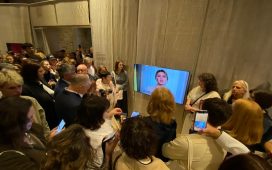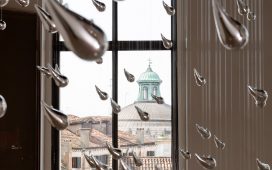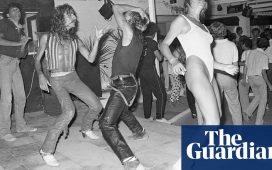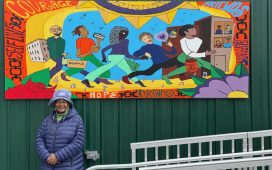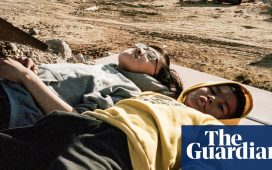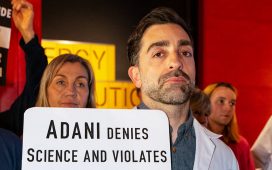The Romantics and Us With Simon Schama (BBC Two) | iPlayer
Louis Theroux: Life on the Edge (BBC Two) | iPlayer
Sue Perkins: Along the US-Mexico Border (BBC One) | iPlayer
The Black Full Monty (Channel 4) | All 4
What an inspired wheeze is Simon Schama’s latest outing, The Romantics and Us. What might have seemed a relatively dry idea on paper – a trawl through 200-year-old art – turned out to be thumpingly relevant to almost every aspect of modern life, even down to last week’s Extinction Rebellion protests and migrant landings.
Because what the Romantics did was nothing less than change our way of thinking about the world. For good and, sometimes, for ill. Blake, Shelley, Delacroix, Wollstonecraft, Chopin and the rest of the gang, Schama argued with cogency, persuasion and some great phrasemaking, gave us little less than the very ideas of democracy, of national belonging (something of a double-edged sword), of obsession with the self, even interest in nature… and “we still think with their mind, we feel with their emotional heartbeat”.
Think you’re the first creative type to dare to put politics into your wilfully controversial art? Delacroix and Géricault got there way first, the latter with his astonishing Raft of the Medusa. Think cancel culture is an achingly millennial movement? Try the Terror, which spread through Mary Wollstonecraft’s adopted Paris in the years after the Revolution when segments of the left, after a handsome and brave new dawn, began to ensure that thinking the wrong thoughts would not merely get you censored but torched out of (or often inside) your own home. Getting righteous and huffy in middle England at the insidious distribution of inflammatory ideas? Again, nothing on Britain’s aristos in the early 1800s, who closed the free press and outlawed atheism. Schama, without ever being too heavy- handed, drew all these and many more parallels directly back to the Romantic squad’s passionate drive to convert the old religions of veneration and obedience to the new ones of insurrection and agitation.
Seldom was this more in evidence in the modern age than France (again) in 1968, students and workers together on barricades. One of Schama’s strengths as a presenter – and good on the broadcaster for resisting the blandishments of a myriad younger and arguably sexier historians – is that he can actually say he was in the streets of Paris during that long fraught hopeful summer (working, I believe, on his first book), and thus has an earned right to tell us all about it.
Crucially, Schama never talks down, or attempts to sugar the pill by presenting a complex argument as anything other. Your brain has to keep up. This is a great series, sadly only three parts. Plus, we get intriguing art lessons along the way – and great readings by Christopher Eccleston, Harriet Walter and hip-hop artist Testament.
If good moment of the week was Louis Theroux video-chatting to twins, first encountered 16 years ago, who have grown into lovely understanding human beings, bad moment of the week was the same terribly young twins being encouraged by their mother, that very long time ago, to form, in essence, a Nazi pop group. Smiley-faced Hitler emojis on the T-shirts, abhorrently racist lyrics. Even in hindsight – Life on the Edge is essentially a back catalogue of greatest hits, interspersed with reflections from an older, bearded, wiser Louis Theroux – this was a grim and nasty watch.

One might argue that Theroux has, throughout his career, with his mix of charm and his inviting, pregnant, come-hither silences, cleverly mixed interviewees of the near-credible type with those of the (frankly) mentally ill type. Nevertheless, he has told wider truths, from the wilder fringes of humanity and the extremes of belief – often toxic, or merely of the fruit-loopy conspiracist mindset (JFK: it was suicide) – and thus expanded our conversations. The twins’ mother, April, he did not blame: she was “incapable of seeing anything through a non-racial lens”. Can any among us feel anything else, now, except pity?
Theroux’s fascination is and always has been the exploitation of the vulnerable, and the fact even the most absurd charlatan can inspire real results. But Theroux is inextricably drawn to charlatans, and long may that continue.
I have read and heard some mild criticism regarding Sue Perkins being given the big two-nighter documentary Along the US-Mexico Border, seeking some truths about the wall, the border and immigration. Why not a grownup journalist?
I’ll tell you exactly why. Perkins is by far the most apt person for the job. She overflows with both natural wit and empathy, and is often braver than she looks. Plus, one aspect of bravery is being unafraid of nuance, of grey areas, open to the concept that one might hold two ideas in one’s head at the same time.

There was little doubt where her loyalties lay: the impassioned plea for fairness towards the end of the second episode showed that Perkins is nothing less than a true romantic. But she was demonstrably capable of showing the same understanding (and warm humour, reciprocated in kind) towards a good-ole-boy Texan rancher overrun nightly by migrants, as she would show to the dirt-poor, and the fleeing, themselves. A news reporter might have let slip far more righteous Trump-contempt; Perkins was sparing with her snark, and thus the programme was greater for letting us make up our own minds. A truly enlightening couple of nights.
Not sure whether Leicester’s having a good year of it. It was at a nightclub there where one of the Chocolate Men – a troupe of 12 black strippers, who have, in co-founder Louis’s words, “to be good dancers and have a penis length of more than eight inches” – got carried away on his debut dance. In what must have been the most eggshell-fraught phrase uttered in voiceover this year, “Django allows a woman to briefly engage in oral sex with him”.
So many questions, which the makers of The Black Full Monty, Channel 4’s documentary about Britain’s first all-black male strip group, duly, if but occasionally, asked.
“Some might say what you’re doing is perpetuating stereotypes?” “Are you selling sex, or are you selling race?” Louis and co-promoter Dante gamely tried to bat them back: “You can never satisfy everyone… anything you do as a black guy is going to be hard… it’s a stepping-stone, people are earning money, living good, what about that?” But I’m not sure we ever got an answer that would satisfy, say, the head of race and gender studies at Oxbridge Polyversity.

Perhaps, because there are so many questions about this, we should (as the makers tended to in the end) just see it a little bit of good dirty fun. As one young Dubliner – the £25-a-head audiences are overwhelmingly white – noted: “Think of the years we’ve suffered, tolerated, women being objectified. It’s nice to kind of appreciate the male form with a bit of vulgarity, a wee bit of an obnoxious nature, so we appreciated it. And why not, like?”

